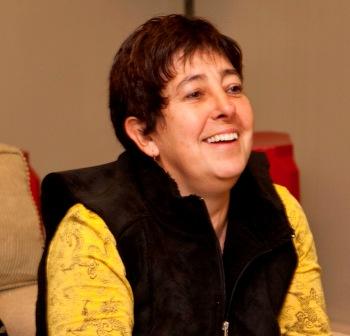
The Vice-Chancellor’s Distinguished Teaching Award recipients for 2011, Prof Anthea Garman unpacked her self-reflexive approach to teaching journalism in a fast-paced world. She thinks of teaching as a way of “inducting students into the practice of becoming ‘interpreters of the world’”.
This is certainly one of the qualities of an excellent teacher, discussing and questioning perceptions but always allowing the students to create their own stories. She says delivering her award lecture entitled: “Rewrite, Revise, Refine, Reflect, Rethink: the long and short of teaching Journalism at Rhodes.”
“We are teaching not just techniques but ways of being, ways of approaching knowledge, and ways of using and communicating that knowledge. We are showing them that they are becoming a distinctive community of knowledge producers with choices, responsibilities and ethical commitments,” she says.
“I teach because after years of knowing something, a single question or comment from a student can upset, alter or enhance that knowledge. I keep on teaching as the age gap between me and my students widens because I want to be challenged by different experiences, different ways of being and seeing.”
“It’s fitting to pay tribute to the School in which I teach, the colleagues among whom my teaching is honed and sharpened and the institution, Rhodes, which takes the practice of teaching so seriously it puts real resources into realising its excellence,” she says.
In her characteristic pragmatic and perceptive way, she acknowledged that the skills she teaches are complex and difficult, underscored by how the Post-graduate Diploma in Journalism students often take up to three weeks to write a story that, according to the industry standard, should take a few hours.
“Our students come to us with a common-sense or, TV- and movie-fed understanding of journalism – an attitude and knowledge we have to work with and they often just want to be filled up with skills so that they can get jobs,” she says.
“I have to keep on engaging with and considering the impact of new media and the changes it is working on old media and the teaching of old media (such as newspapers and magazines) without losing particularly useful functions and forms of old media which are useful for teaching,” she added.
It is this combination of using both new media and traditional practice which keeps her on the cutting edge.
“In our interactions with the media industries, we are often told that our preoccupation with theory and the intellectual is a wasted pursuit because skills are more highly prized than sophisticated thinking or critical questioning. We deliberately work against this functionalist and overly pragmatic attitude.”
Prof Garman teaches first year students, in classes of up to 300; third and fourth year writing and editing and she supervises MA and PhD students.
She makes use of a lot of visual material and draws a great deal from the class’s own experiences. “It can’t just be an intellectual experience,” she emphasised. “My own teaching is always preoccupied with the experiential and the personal.”
This is why she relishes teaching the long-form journalism course, a genre made famous by Rian Malan and Mark Gevisser. Here “a suspension of moral judgement,” which is often a characteristic of the news story, and “slow thinking and digestion” is used to breach the discourse boundaries of journalism. In the course she has been teaching since 2008, the students create their own pieces of long form journalism.
While still listening to and engaging with editors and journalists, she doesn’t allow mainstream news media to dictate what she teaches. “I figure out ways to provoke students to determine value and importance – and therefore detect stories worth telling – in the world around them.”
Having joined Rhodes in 1997 as a journalist with 16 years’ experience in the newsroom, she continues to create innovative courses for students of the Rhodes School of Journalism and Media Studies.
By Anna-Karien Otto
Picture by Sophie Smith
